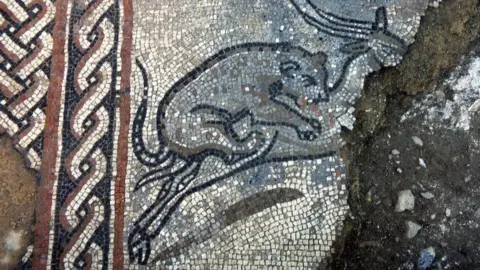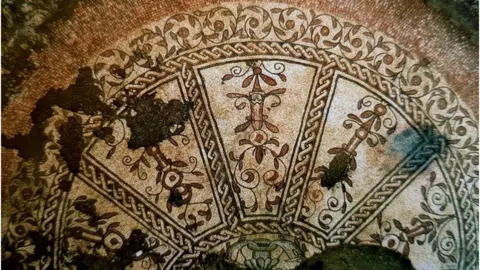Dewlish Roman leopard attack mosaic gets temporary export bar
 Bournemouth University Bill Putnam Collection
Bournemouth University Bill Putnam CollectionAn "exceptional" Roman mosaic showing a leopard attacking an antelope is at risk of being exported unless a buyer can be found to match its £135,000 asking price, the government has said.
The 1,600-year-old floor panel was unearthed by archaeologists in Dewlish, Dorset, in 1974.
The government has placed a temporary export bar on the fragment until 16 October because of its quality.
Government advisers called it a "tour de force of the mosaicist's art".
The mosaic, which was discovered in the grounds of Dewlish House, is thought to have formed part of the flooring of a luxurious Roman villa.
The government said it had been advised to suspend the export due to the "exceptional workmanship" and research value.
 Bournemouth University Bill Putnam Collection
Bournemouth University Bill Putnam CollectionThe advisers - the Reviewing Committee on the Export of Works of Art and Objects of Cultural Interest (RCEWA) - said the fragment's "theme of domination" suggested the high status of the villa's owner.
Committee member Leslie Webster said: "The mosaic's spirited depiction of a leopard bringing down an antelope is a brilliantly accomplished image of nature red in tooth and claw.
"For us to lose it from Britain would be a great misfortune."
The panel, measuring 2m by 2.4m (6.5ft by 8 ft), was held by the owners of Dewlish House until it was sold at auction in 2018 for £28,000.
The buyer, antiques dealer Edward Hurst, said he was selling it to "one of the great international collectors".
He added: "It's extraordinary to have had to wait over a year since applying for the export licence to arrive at this outcome.
"We're supposed to be open for business. What message does this send to the international art world?"
The government said a decision on the licence could be extended until January if a prospective UK buyer came forward.
